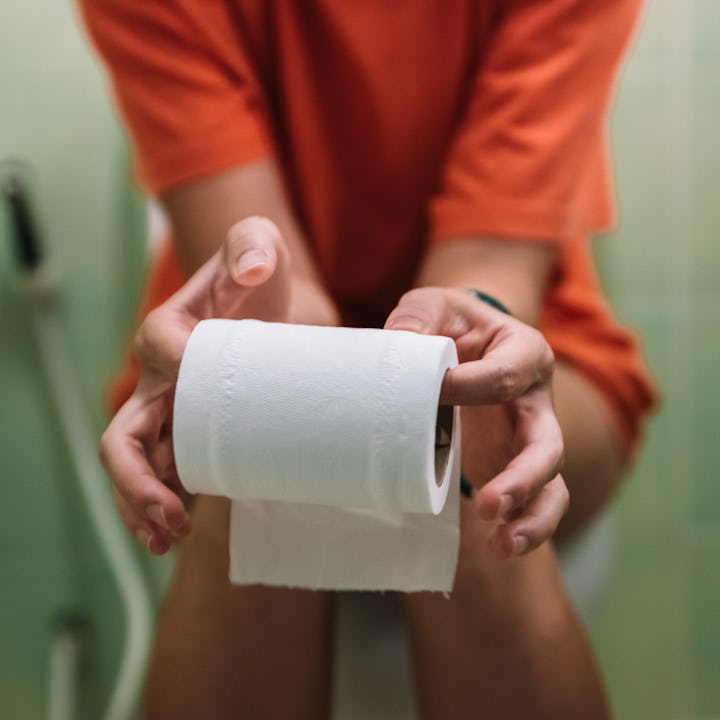Why Do I Feel Like I Have To Pee Every 5 Minutes?
Is this just one more form of malicious compliance from my body since I hit 40, or should I actually worry? I asked a urologist for answers.

We’re friends, right? So, I feel comfortable telling you that I’ve always been a pretty prolific pee-er (a very scientific term). I drink a lot of water every day, so my frequent bathroom breaks have never really struck me as strange. However... among my body’s many little forms of malicious compliance since I hit 40 is a seeming uptick in urination. Like, why do I feel like I have to pee every five minutes?
Googling just left me half-convinced that I must have some rare form of bladder cancer, so I did the responsible thing on behalf of myself and all extra-pee-ey women like me, and I reached out to an actual doctor for more insight. “As a urologist, in my everyday practice, I often see and treat women — particularly in their mid-adult years — who come to my outpatient clinic or need consultation with this frustrating complaint,” Dr. Martina Ambardjieva, a urologist and part of the online healthcare platform Dr. Telx, tells me.
So, rest assured, it’s a pretty common issue (and not some hard-to-pronounce incurable ailment, whew!). Here’s what else Dr. Ambardjieva shared.
How much peeing is considered “normal”?
Most of us clock it quickly when we’re not peeing enough. I mean, if you’re only peeing once or twice a day, you’ve undoubtedly done some Googling of your own about what’s up. But what’s the Goldilocks number when it comes to urinating? How much is just right?
Obviously, every person’s body is different. But, according to Ambardjieva, there is a generally accepted metric we can go by. “On average, urinating six to eight times per day is considered normal for most adults,” she says, adding that this number can vary “based on factors like fluid intake, caffeine or alcohol consumption, medications, and even anxiety levels.”
If you’re a hydration queen like me (💁🏼♀️) who drinks half a gallon or more of water per day, Ambardjieva says that frequent urination “may simply mean the body is processing that fluid effectively.”
Feeling like you legit have to go ~constantly~ probably means something else is going on.
Cautions Ambardjieva, “When it becomes excessive — more than 10 times per day, waking up multiple times at night, or feeling like the patient can’t hold the urine — it’s time to look for the underlying cause.”
What are some possible causes of more frequent urination?
An uptick in urination could be due to many factors, most of which are pretty benign. Some of the most common causes for more frequent urination (especially in mid-adult women), says Ambardjieva, are:
Increased Fluid or Caffeine Intake
“Caffeine is a diuretic and bladder irritant,” she says. “Drinking coffee, tea, or energy drinks can increase urinary frequency.” Oopsie! But, uh, we need it to survive. At least the extra trips to the bathroom will help you close the activity ring on your smartwatch.
Urinary Tract Infections (UTIs)
Well, this one’s definitely no fun. What should you look out for? “A burning sensation with urgency or frequency may indicate a UTI. These are common in women due to the shorter urethra.”
Overactive Bladder (OAB)
As in, yes, your bladder doing the damn most might be an actual medical condition in itself. Explains Ambardjieva, “This condition involves sudden, uncontrollable urges to urinate — even when the bladder isn’t full. It's more common in women over 40.”
“Weak pelvic muscles — often due to childbirth or aging — can cause incomplete emptying or urgency,” says Ambardjieva. And as someone who birthed two almost-10-pound babies, I fear this could certainly be part of my problem.
Interstitial Cystitis (Painful Bladder Syndrome)
You’d definitely need a doctor to diagnose this one for you. It’s “a chronic condition causing bladder pressure, pain, and frequent urination without infection.”
Hormonal Changes
“Perimenopause and menopause can alter bladder function due to estrogen fluctuations,” says Ambardjieva. Honestly, this tracks. Perimenopause, can you not?
Medications
Ambardjieva points out that diuretics (for blood pressure or heart issues) can increase urine output, too.
When should you see a doctor about it?
OK, but at what point should you escalate your concerns to a medical professional? It’s hard to work up the nerve to make an appointment for “peeing a lot,” but certain signs really necessitate a professional opinion. Ambardjieva says you should talk to a healthcare provider if you experience:
- Sudden changes in urinary habits
- Pain, burning, or blood in the urine
- Urine leakage or inability to hold urine
- Waking more than once per night to urinate
- Bladder pressure or discomfort that doesn't improve
“These may point to underlying issues that can be effectively managed or treated,” she says.
Do you go to your primary care provider about this, or... ?
So, you’ve decided your frequent need to pee should probably be evaluated by someone other than you and the power vested in you by Google at 3am. Who do you even go to about this?
“The patient should start with a primary care doctor or gynecologist, especially if the symptoms are new or worsening,” Ambardjieva says. “They can rule out infections or hormonal causes. If symptoms persist or interfere with daily life, a referral to a urologist or urogynecologist is a great next step. Urologists can conduct specialized tests, like bladder scans or urodynamics, to understand what’s going on.”